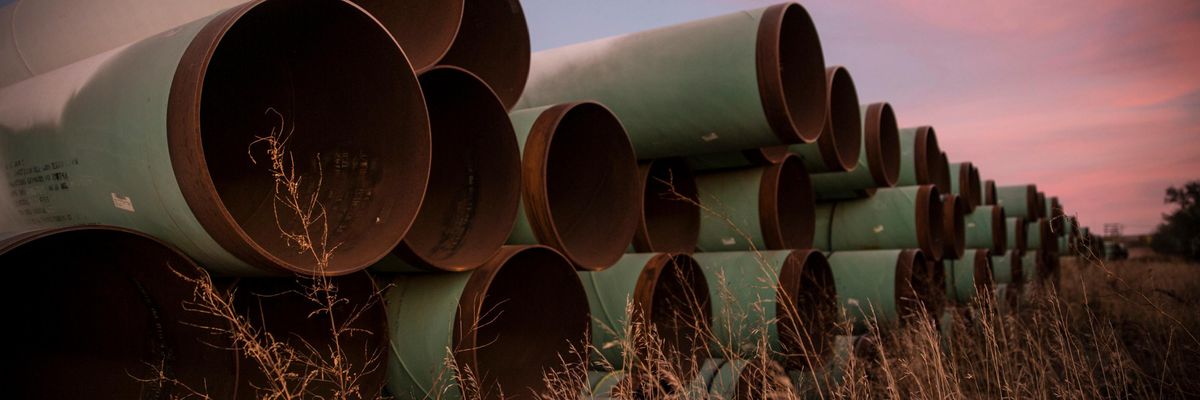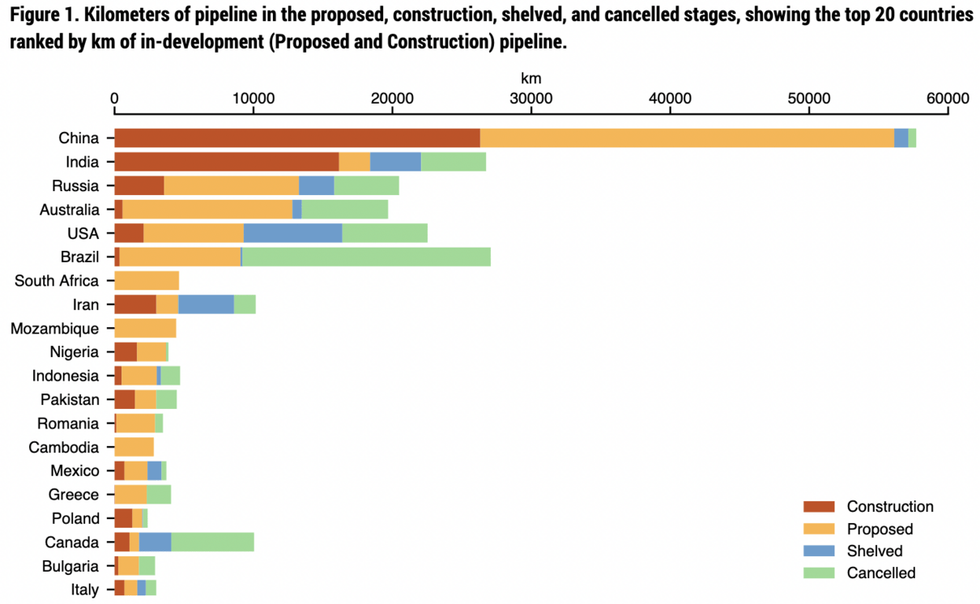

SUBSCRIBE TO OUR FREE NEWSLETTER
Daily news & progressive opinion—funded by the people, not the corporations—delivered straight to your inbox.
5
#000000
#FFFFFF
To donate by check, phone, or other method, see our More Ways to Give page.


Daily news & progressive opinion—funded by the people, not the corporations—delivered straight to your inbox.

Miles of unused pipe, prepared for the proposed Keystone XL pipeline, sit in a lot on October 14, 2014 outside Gascoyne, North Dakota. (Photo: Andrew Burton via Getty Images)
As campaigners and scientists continue to demand keeping fossil fuels in the ground, an analysis on Tuesday revealed the incredible amount of gas development humanity has planned, despite the climate and financial risks.
"The world is at an inflection point, where it can hasten the transition to renewables or further entrench itself in fossil fuels."
The new report--entitled Pipe Dreams 2022: Stranded assets and magical thinking in the proposed global gas pipeline build-out--was authored by a trio of experts at the San Francisco-based Global Energy Monitor (GEM).
"A slowdown in gas pipeline development in 2021 was, unfortunately, more about Covid than a recognition that gas is contributing to the climate crisis," said report co-author Baird Langenbrunner, a research analyst at GEM, in a statement.
"Looking ahead, the fact that nearly half-a-trillion dollars of gas pipelines are in development makes no sense economically," he warned, "as many of these projects will become stranded assets as the world transitions to renewable."
Stranded assets, as Carbon Tracker explains, are "assets that turn out to be worth less than expected as a result of changes associated with the energy transition."
The GEM report states that "after a Covid-19-related drop in pipeline commissionings in 2021, the gas industry and gas-positive countries led by China, India, Russia, Australia, the United States, and Brazil are pushing ahead with plans to commission tens of thousands of kilometers of gas pipelines in 2022."
The analysis projects that the planned expansion of the global gas pipeline network--70,889 kilometers (km) or 44,048 miles in construction and another 122,477 km or 76,104 miles in pre-construction development--creates a $485.8 billion stranded asset risk, in addition to jeopardizing the chances of meeting the Paris climate agreement's goals.

China leads with 56,120 km (34,871 miles) of pipeline proposed or under construction. India follows with 18,389 km (11,426 miles), then Russia with 13,267 km (8,244 miles), Australia with 12,798 km (7,952 miles), the United States with 9,295 km (5,776 miles), and Brazil with 8,021 km (4,984 miles).
The planned expansion in China amounts to a stranded asset risk of $89.1 billion, the analysis says, noting that "the Chinese pipeline boom is happening under the direction of the newly created conglomerate PipeChina, the world's second-largest developer of gas pipelines behind Russia's Gazprom."
In the United States, "rising opposition from NGOs and activists, and a shifting legal and regulatory landscape, contributed to the defeat of several high-profile pipelines in 2020-21," the report points out. "However, there are still pipelines costing an estimated $47.6 billion being developed, and the U.S. is expected to become the world's leading exporter of gas in 2022."
Climate activists have accused U.S. President Joe Biden of failing to meet his campaign promises by enabling ongoing and future fossil fuel development.
Related Content

Expansion of gas infrastructure around the world is underway despite warnings from climate scientists and other experts--including the Paris-based International Energy Agency (IEA)--that humanity must stop extracting and burning fossil fuels to meet the more ambitious Paris goal of limiting global temperature rise this century to 1.5degC above preindustrial levels.
"The world is at an inflection point, where it can hasten the transition to renewables or further entrench itself in fossil fuels," the analysis states, calling planned pipelines "counterproductive to the 1.5degC Paris goal and a green transition."
The report also emphasizes that the global expansion's scale and lifetime stand "in misguided defiance of the IEA's net-zero pathway, which stresses no new investment in fossil fuel supply projects."
Dear Common Dreams reader, The U.S. is on a fast track to authoritarianism like nothing I've ever seen. Meanwhile, corporate news outlets are utterly capitulating to Trump, twisting their coverage to avoid drawing his ire while lining up to stuff cash in his pockets. That's why I believe that Common Dreams is doing the best and most consequential reporting that we've ever done. Our small but mighty team is a progressive reporting powerhouse, covering the news every day that the corporate media never will. Our mission has always been simple: To inform. To inspire. And to ignite change for the common good. Now here's the key piece that I want all our readers to understand: None of this would be possible without your financial support. That's not just some fundraising cliche. It's the absolute and literal truth. We don't accept corporate advertising and never will. We don't have a paywall because we don't think people should be blocked from critical news based on their ability to pay. Everything we do is funded by the donations of readers like you. Will you donate now to help power the nonprofit, independent reporting of Common Dreams? Thank you for being a vital member of our community. Together, we can keep independent journalism alive when it’s needed most. - Craig Brown, Co-founder |
As campaigners and scientists continue to demand keeping fossil fuels in the ground, an analysis on Tuesday revealed the incredible amount of gas development humanity has planned, despite the climate and financial risks.
"The world is at an inflection point, where it can hasten the transition to renewables or further entrench itself in fossil fuels."
The new report--entitled Pipe Dreams 2022: Stranded assets and magical thinking in the proposed global gas pipeline build-out--was authored by a trio of experts at the San Francisco-based Global Energy Monitor (GEM).
"A slowdown in gas pipeline development in 2021 was, unfortunately, more about Covid than a recognition that gas is contributing to the climate crisis," said report co-author Baird Langenbrunner, a research analyst at GEM, in a statement.
"Looking ahead, the fact that nearly half-a-trillion dollars of gas pipelines are in development makes no sense economically," he warned, "as many of these projects will become stranded assets as the world transitions to renewable."
Stranded assets, as Carbon Tracker explains, are "assets that turn out to be worth less than expected as a result of changes associated with the energy transition."
The GEM report states that "after a Covid-19-related drop in pipeline commissionings in 2021, the gas industry and gas-positive countries led by China, India, Russia, Australia, the United States, and Brazil are pushing ahead with plans to commission tens of thousands of kilometers of gas pipelines in 2022."
The analysis projects that the planned expansion of the global gas pipeline network--70,889 kilometers (km) or 44,048 miles in construction and another 122,477 km or 76,104 miles in pre-construction development--creates a $485.8 billion stranded asset risk, in addition to jeopardizing the chances of meeting the Paris climate agreement's goals.

China leads with 56,120 km (34,871 miles) of pipeline proposed or under construction. India follows with 18,389 km (11,426 miles), then Russia with 13,267 km (8,244 miles), Australia with 12,798 km (7,952 miles), the United States with 9,295 km (5,776 miles), and Brazil with 8,021 km (4,984 miles).
The planned expansion in China amounts to a stranded asset risk of $89.1 billion, the analysis says, noting that "the Chinese pipeline boom is happening under the direction of the newly created conglomerate PipeChina, the world's second-largest developer of gas pipelines behind Russia's Gazprom."
In the United States, "rising opposition from NGOs and activists, and a shifting legal and regulatory landscape, contributed to the defeat of several high-profile pipelines in 2020-21," the report points out. "However, there are still pipelines costing an estimated $47.6 billion being developed, and the U.S. is expected to become the world's leading exporter of gas in 2022."
Climate activists have accused U.S. President Joe Biden of failing to meet his campaign promises by enabling ongoing and future fossil fuel development.
Related Content

Expansion of gas infrastructure around the world is underway despite warnings from climate scientists and other experts--including the Paris-based International Energy Agency (IEA)--that humanity must stop extracting and burning fossil fuels to meet the more ambitious Paris goal of limiting global temperature rise this century to 1.5degC above preindustrial levels.
"The world is at an inflection point, where it can hasten the transition to renewables or further entrench itself in fossil fuels," the analysis states, calling planned pipelines "counterproductive to the 1.5degC Paris goal and a green transition."
The report also emphasizes that the global expansion's scale and lifetime stand "in misguided defiance of the IEA's net-zero pathway, which stresses no new investment in fossil fuel supply projects."
As campaigners and scientists continue to demand keeping fossil fuels in the ground, an analysis on Tuesday revealed the incredible amount of gas development humanity has planned, despite the climate and financial risks.
"The world is at an inflection point, where it can hasten the transition to renewables or further entrench itself in fossil fuels."
The new report--entitled Pipe Dreams 2022: Stranded assets and magical thinking in the proposed global gas pipeline build-out--was authored by a trio of experts at the San Francisco-based Global Energy Monitor (GEM).
"A slowdown in gas pipeline development in 2021 was, unfortunately, more about Covid than a recognition that gas is contributing to the climate crisis," said report co-author Baird Langenbrunner, a research analyst at GEM, in a statement.
"Looking ahead, the fact that nearly half-a-trillion dollars of gas pipelines are in development makes no sense economically," he warned, "as many of these projects will become stranded assets as the world transitions to renewable."
Stranded assets, as Carbon Tracker explains, are "assets that turn out to be worth less than expected as a result of changes associated with the energy transition."
The GEM report states that "after a Covid-19-related drop in pipeline commissionings in 2021, the gas industry and gas-positive countries led by China, India, Russia, Australia, the United States, and Brazil are pushing ahead with plans to commission tens of thousands of kilometers of gas pipelines in 2022."
The analysis projects that the planned expansion of the global gas pipeline network--70,889 kilometers (km) or 44,048 miles in construction and another 122,477 km or 76,104 miles in pre-construction development--creates a $485.8 billion stranded asset risk, in addition to jeopardizing the chances of meeting the Paris climate agreement's goals.

China leads with 56,120 km (34,871 miles) of pipeline proposed or under construction. India follows with 18,389 km (11,426 miles), then Russia with 13,267 km (8,244 miles), Australia with 12,798 km (7,952 miles), the United States with 9,295 km (5,776 miles), and Brazil with 8,021 km (4,984 miles).
The planned expansion in China amounts to a stranded asset risk of $89.1 billion, the analysis says, noting that "the Chinese pipeline boom is happening under the direction of the newly created conglomerate PipeChina, the world's second-largest developer of gas pipelines behind Russia's Gazprom."
In the United States, "rising opposition from NGOs and activists, and a shifting legal and regulatory landscape, contributed to the defeat of several high-profile pipelines in 2020-21," the report points out. "However, there are still pipelines costing an estimated $47.6 billion being developed, and the U.S. is expected to become the world's leading exporter of gas in 2022."
Climate activists have accused U.S. President Joe Biden of failing to meet his campaign promises by enabling ongoing and future fossil fuel development.
Related Content

Expansion of gas infrastructure around the world is underway despite warnings from climate scientists and other experts--including the Paris-based International Energy Agency (IEA)--that humanity must stop extracting and burning fossil fuels to meet the more ambitious Paris goal of limiting global temperature rise this century to 1.5degC above preindustrial levels.
"The world is at an inflection point, where it can hasten the transition to renewables or further entrench itself in fossil fuels," the analysis states, calling planned pipelines "counterproductive to the 1.5degC Paris goal and a green transition."
The report also emphasizes that the global expansion's scale and lifetime stand "in misguided defiance of the IEA's net-zero pathway, which stresses no new investment in fossil fuel supply projects."